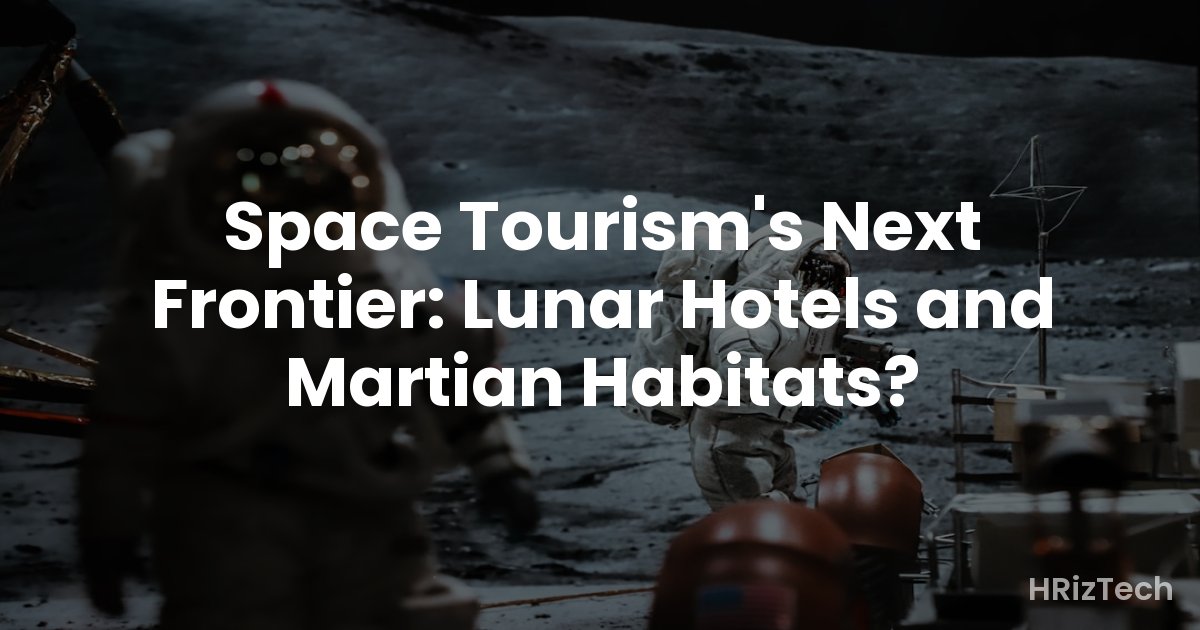Space Tourism's Next Frontier: Lunar Hotels and Martian Habitats?
- Space tourism is rapidly evolving beyond Earth orbit.
- Lunar hotels and Martian habitats are on the horizon, promising incredible experiences.
- Significant technological and logistical challenges remain.
- The cost of space travel needs to decrease for wider accessibility.
- Ethical considerations surrounding space exploration and resource utilization are crucial.
Beyond the Orbital Hotel: The Allure of Lunar Lodging
Forget cramped spaceships orbiting Earth – the next big thing in space tourism might be a luxurious stay on the Moon. Several companies are vying to build the first lunar hotels, promising breathtaking views of Earth and a truly unforgettable experience. Imagine waking up to the sunrise over the lunar landscape, taking a stroll in a pressurized rover across the Sea of Tranquility, or even participating in a lunar golf tournament (though the low gravity might require some adjustments to your swing!).
The Challenges of Lunar Construction
Building a hotel on the Moon is no small feat. The extreme temperature variations, the lack of atmosphere, and the constant bombardment of micrometeoroids present significant engineering challenges. Materials need to be incredibly durable and radiation shielding will be paramount to ensure guest safety. Transportation of building materials and personnel will also be a massive undertaking, requiring innovative and cost-effective solutions.
The Economics of Lunar Tourism
The cost of a lunar vacation is currently prohibitive for most people. A single trip to the International Space Station can cost tens of millions of dollars. For lunar tourism to become accessible to a wider audience, significant reductions in launch costs and advancements in reusable spacecraft technology are necessary. Furthermore, the development of in-situ resource utilization (ISRU) techniques – using lunar resources to build and sustain the hotel – could drastically reduce the reliance on Earth-based supplies.
Reaching for the Red Planet: Martian Habitats
While lunar hotels might be closer to reality, the ultimate goal for many space tourism enthusiasts is a trip to Mars. The challenges are even greater here, but the rewards – the chance to set foot on another planet – are undeniably alluring.
Designing for Martian Life
Martian habitats will need to be completely self-sufficient, providing everything from oxygen and water to food and power. They'll need to withstand the harsh Martian environment, including extreme cold, thin atmosphere, and radiation exposure. Innovative architectural designs are being explored, including underground habitats to provide protection from radiation and utilize the planet's resources.
The Ethical Dimensions of Martian Exploration
The exploration and potential colonization of Mars raise significant ethical questions. The possibility of discovering extraterrestrial life, even microbial, demands careful consideration of planetary protection protocols. Furthermore, the long-term impact of human presence on the Martian environment needs to be carefully assessed and mitigated.
The Technological Hurdles
Sending humans to Mars requires a massive technological leap. Developing a reliable and efficient propulsion system for interplanetary travel is crucial. Life support systems capable of sustaining human life during the long journey and on the Martian surface need to be perfected. And, of course, the cost of a Mars mission is astronomical – both literally and figuratively.
The Future of Space Tourism
The future of space tourism is bright, but it's not without its challenges. The development of lunar hotels and Martian habitats will require significant technological advancements, substantial investment, and international cooperation. However, the potential rewards – the expansion of human civilization beyond Earth, the fostering of scientific discovery, and the creation of awe-inspiring tourist experiences – are well worth the effort.
Key Takeaways:
- Lunar hotels and Martian habitats represent the next frontier in space tourism.
- Significant technological and logistical hurdles remain.
- Cost reduction and resource utilization are key factors for wider accessibility.
- Ethical considerations surrounding space exploration are paramount.
- International cooperation is essential for success.
The Long-Term Vision
Beyond hotels and habitats, the future might hold even more ambitious projects, like space-based telescopes for amateur astronomers, zero-gravity sporting events, or even space-based manufacturing facilities. The possibilities are endless, limited only by our imagination and our technological capabilities.
The Call to Action
What are your thoughts on the future of space tourism? Do you think lunar hotels and Martian habitats are realistic goals, or are they still decades away? Share your predictions and opinions in the comments below!

Comments
No comments yet. Be the first to comment!